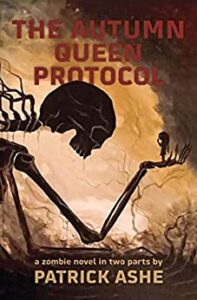The Winter Queen Contingency received a 4+ star review, making it an IndieReader Approved title.
Following find an interview with author Patrick Ashe.
What is the name of the book and when was it published?
The Winter Queen Contingency, March 14, 2023.
What’s the book’s first line?
“We are out of time!”
What’s the book about? Give us the “pitch”.
Two world-weary warriors keep the bloodthirsty infected at bay. But the infected are getting smarter at an exponential rate. And unlike the rest of us, they can survive the coming nuclear fallout of a world coming apart. Fortunately, one of those warriors is a brilliant strategist, and has a secret long-term plan that might work against this dual apocalyptic threat . . .

After finishing The Autumn Queen Protocol, a friend asked when I’d write a sequel, which I hadn’t seriously considered. Coming out of the pandemic, with renewed geopolitical concerns following Russia’s invasion of Ukraine, I thought of this second topical story.
What’s the main reason someone should really read this book?
If you also love when action and intense plots are paired with thoughtful prose and timely allegory (e.g., Aliens and The Matrix), with stories and atmosphere akin to classic gaming (e.g., Castlevania meets Halo in the 21st Century), then my books are for you. I pride myself on food-for-thought, relatable characters, and earning a few twists. If you check my reviews, I think you’ll find that others agree. (Also see my TV Tropes pages!)
What’s the most distinctive thing about the main character? Who-real or fictional-would you say the character reminds you of?
Angelina, the main character of Part Two, is exceedingly patient with her less scrupulous peers, and has immense, yet understated strength. She embodies speaking softly while carrying a large stick. I realized after writing this book that these qualities remind me of my spouse.
When did you first decide to become an author?
First Grade. Life got in the way until my late 30’s.
Is this the first book you’ve written?
It’s my fourth. I have about eight more I’ve been planning over many years.
What do you do for work when you’re not writing?
Nonprofit management, primarily program evaluation. In short, it means using stats and research methods to determine how effective an organization is at achieving its mission. (Thus my data analyst characters, of course.)
How much time do you generally spend on your writing?
Roughly two hours a day.
What’s the best and the hardest part of being an indie?
The best is creative freedom. The hardest is marketing. I fully appreciate marketing as a skill and utility, especially because I don’t think I have any natural talent for it. I have no doubt this flaw has hampered my reach.
What’s a great piece of advice that you can share with fellow indie authors?
Don’t wait for inspiration. If you really want to write that book, any start is better than no start. Inspiration will come on its own as long as you’re taking action. I can’t remember where I heard this, but write that first draft like you’re your own biggest fan, and then edit it like you’re your harshest critic. Set aside dedicated time; every day, if possible. If life occasionally interrupts that time, fine, but getting on a regular schedule is critical. I have a full-time job, I’m married, and have a child with special needs, as well as health conditions that impact my daily life. It can be done (at least with these constraints).
Would you go traditional if a publisher came calling? If so, why?
Yes. Precisely because of the difficulty of marketing.
Is there something in particular that motivates you (fame? fortune?)
Reaching potential readers. Hearing back that something in my writing resonated with them, or even if they simply enjoyed the plot, characters, atmosphere, etc.
Which writer, living or dead, do you most admire?
Leonard Cohen. His lines and lyrics are not only skillful, but soulful. “To speak intimately with strangers about the distances of lovers,” as I wrote in a poem from Typical Tragedies that I dedicated to him.
Which book do you wish you could have written?
The Road by Cormac McCarthy. It was exactly the post-apocalyptic book I’d been wanting to read when I found it. Many say it lacks hope, but I entirely disagree. To keep putting one foot in front of the other in a world like that (which may be metaphorical for dire aspects of our own) is hope on hyperfuel.

